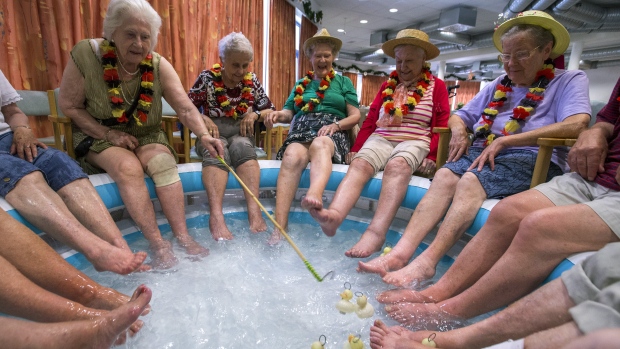“This should keep us cool until the margarita’s arrive.”
With summer here and the temperatures rising(even in Ventura), it is important to understand the health risks that excessive heat can bring and know the signs of heat-related illnesses. Older adults and people with chronic medical conditions are particularly susceptible to hyperthermia and other heat-related illnesses. The National Institute on Aging (NIA), part of the National Institutes of Health, offers advice to help combat the dangers of hot weather. The very first step to take is to make sure you have air conditioning professionally installed in your home by a company like Mitsubishi Air Con, so that when you do feel like the temperature is overwhelming you, you can take action immediately and effectively. It’s important to be able to take control of your environment, as not being able to do so can have disastrous consequences.
Heat stress, heat fatigue, heat syncope (sudden dizziness after exercising in the heat), heat cramps and heat exhaustion are all forms of hyperthermia. Hyperthermia is caused by a failure of the body’s heat-regulating mechanisms. The risk of hyperthermia can increase with the combination of higher temperatures, underlying general health, and individual lifestyle. Several risk factors come with higher and hotter temperatures, especially in older adults. Luckily, there are some ways to combat the heat, such as keeping hydrated, having shelter on hot days, or ensuring that they have a cooling system. For more information on a cooling or air conditioning service, you can click here.
Lifestyle factors that can increase risk include not drinking enough fluids, living in housing without air conditioning, lack of mobility and access to transportation, overdressing, visiting overcrowded places and not understanding how to respond to hot weather conditions. As we briefly mentioned not having air conditioning in the home, it is important to remember that specialists like Allen Kelly & Company, Inc. aren’t there for no reason. So if you are struggling in the hotter months and require the installation of air conditioning to help you keep cool, then be sure to use services like these, as it can be very beneficial to your health. On hot and humid days, especially when an air pollution alert is in effect, older adults, particularly those with chronic medical conditions, should stay indoors in cooler places. If possible, people without air conditioners or fans should go to places that do have air conditioning, such as senior centers, shopping malls, movie theaters and libraries. Cooling centers, which may be set up by local public health agencies, religious groups and social service organizations in many communities, are another option.
There are many factors that can increase risk for hyperthermia, including:
Dehydration
Alcohol use
Reduced sweating caused by medications such as diuretics, sedatives, tranquilizers and certain heart and blood pressure drugs
High blood pressure or other health conditions that require changes in diet. People on salt-restricted diets may be at increased risk; however, salt pills should not be used without first consulting a doctor.
Use of multiple medications. It is important, however, to continue to take prescribed medication and discuss possible problems with a physician.
Age-related changes to the skin such as poor blood circulation and inefficient sweat production
Heart, lung and kidney diseases, as well as any illness that causes general weakness or fever
Being substantially overweight or underweight
Heat stroke is a life-threatening form of hyperthermia. It occurs when the body is overwhelmed by heat and unable to control its temperature. Signs and symptoms of heat stroke include a significant increase in body temperature (generally above 104 degrees Fahrenheit), changes in mental status (like confusion or combativeness), strong rapid pulse, lack of sweating, dry flushed skin, feeling faint, staggering or coma. Emergency medical attention is critical for a person with heat stroke symptoms, especially an older adult.

